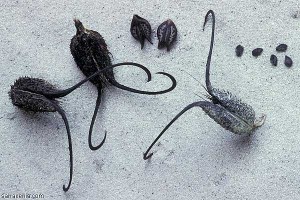Devil’s claw is an herb. The botanical name, Harpagophytum, means “hook plant” in Greek. This plant, which is native to Africa, gets its name from the appearance of its fruit, which is covered with hooks meant to attach onto animals in order to spread the seeds. The roots and tubers of the plant are used to make medicine.
Contents
Uses
- Devil’s claw is a folk remedy used for an extensive range of diseases, including arthritis and rheumatism. Clinical trials are generally supportive of its use as an anti-inflammatory and analgesic in low back pain and osteoarthritis
Benefits
Devil’s claw is used for “hardening of the arteries” (atherosclerosis), arthritis, gout, muscle pain (myalgia), back pain, tendonitis, chest pain, gastrointestinal (GI) upset or heart burn, fever, and migraineheadache. It is also used for difficulties in childbirth, menstrual problems, allergic reactions, loss of appetite, and kidney and bladderdisease.
Some people apply devil’s claw to the skin for injuries and other skin conditions.
Cautions
- Pregnancy and breast-feeding: Devil’s claw is POSSIBLY UNSAFE. It might harm the developing fetus. Avoid use in pregnancy. It is also best to avoid using devil’s claw while breast-feeding. Not enough is known yet about its safety during breast-feeding.
- Heart problems, high blood pressure, low blood pressure: Since devil’s claw can affect heart rate, heartbeat, and blood pressure, it might harm people with disorders of the heart and circulatory system. If you have one of these conditions, talk with your healthcare provider before starting devil’s claw.
- Diabetes: Devil’s claw might lower blood sugar levels. Using it along with medications that lower blood sugar might cause blood sugar to drop too low. Monitor blood glucose levels closely. Your healthcare provider might need to adjust your dose of diabetes medications.
- Gallstones: Devil’s claw might increase bile production. This could be a problem for people with gallstones. Avoid using devil’s claw.
- Peptic ulcer disease (PUD): Since devil’s claw might increase the production of stomach acids, it might harm people with stomach ulcers. Avoid using devil’s claw.
Interactions
- Medications changed by the liver (Cytochrome P450 2C19 (CYP2C19) substrates) interacts with DEVIL’S CLAW
Some medications are changed and broken down by the liver.Devil’s claw might decrease how quickly the liver breaks down some medications. Taking devil’s claw along with some medications that are broken down by the liver can increase the effects and side effects of some medications. Before taking devil’s claw talk to your healthcare provider if you take any medications that are changed by the liver.Some medications that are changed by the liver include omeprazole (Prilosec), lansoprazole (Prevacid), and pantoprazole (Protonix); diazepam (Valium); carisoprodol (Soma); nelfinavir (Viracept); and others. - Medications changed by the liver (Cytochrome P450 2C9 (CYP2C9) substrates) interacts with DEVIL’S CLAW
Some medications are changed and broken down by the liver.Devil’s claw might decrease how quickly the liver breaks down some medications. Taking devil’s claw along with some medications that are broken down by the liver can increase the effects and side effects of some medications. Before taking devil’s claw talk to your healthcare provider if you take any medications that are changed by the liver.Some medications that are changed by the liver include diclofenac (Cataflam, Voltaren), ibuprofen (Motrin), meloxicam (Mobic), and piroxicam (Feldene); celecoxib (Celebrex); amitriptyline (Elavil); warfarin (Coumadin); glipizide (Glucotrol); losartan (Cozaar); and others. - Medications changed by the liver (Cytochrome P450 3A4 (CYP3A4) substrates) interacts with DEVIL’S CLAW
Some medications are changed and broken down by the liver.Devil’s claw might decrease how quickly the liver breaks down some medications. Taking devil’s claw along with some medications that are broken down by the liver can increase the effects and side effects of some medications. Before taking devil’s claw, talk to your healthcare provider if you are taking any medications that are changed by the liver.Some medications changed by the liver include lovastatin (Mevacor), ketoconazole (Nizoral), itraconazole (Sporanox), fexofenadine (Allegra), triazolam (Halcion), and many others. - Warfarin (Coumadin) interacts with DEVIL’S CLAW
Warfarin (Coumadin) is used to slow blood clotting. Devil’s claw might increase the effects of warfarin (Coumadin) and increase the chances of bruising and bleeding. Be sure to have your blood checked regularly. The dose of your warfarin (Coumadin) might need to be changed. - Medications that decrease stomach acid (H2-Blockers) interacts with DEVIL’S CLAW
Devil’s claw might increase stomach acid. By increasing stomach acid, devil’s claw might decrease the effectiveness of some medications that decrease stomach acid, called H2-Blockers.Some medications that decrease stomach acid include cimetidine (Tagamet), ranitidine (Zantac), nizatidine (Axid), and famotidine (Pepcid). - Medications that decrease stomach acid (Proton pump inhibitors) interacts with DEVIL’S CLAW
Devil’s claw might increase stomach acid. By increasing stomach acid, devil’s claw might decrease the effectiveness of medications that are used to decrease stomach acid, called proton pump inhibitors.Some medications that decrease stomach acid include omeprazole (Prilosec), lansoprazole (Prevacid), rabeprazole (Aciphex), pantoprazole (Protonix), and esomeprazole (Nexium)
Other names
Devils Claw, Devil’s Claw Root, Garra del Diablo, Grapple Plant, Griffe du Diable, Harpagophyti Radix, Harpagophytum, Harpagophytum procumbens, Harpagophytum zeyheri, Racine de Griffe du Diable, Racine de Windhoek, Teufelskrallenwurzel, Uncaria procumbens, Wood Spider
References
Source: Drugs.com, http://www.drugs.com/npp/devil-s-claw.html

